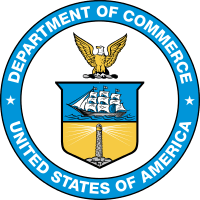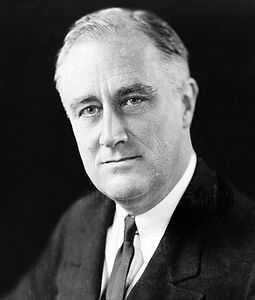Daniel C. Roper
| Daniel C. Roper | |
|---|---|
 | |
| 7th United States Secretary of Commerce | |
| In office March 4, 1933 – December 23, 1938 | |
| President | Franklin D. Roosevelt |
| Preceded by | Roy D. Chapin |
| Succeeded by | Harry L. Hopkins |
| 5th United States Ambassador to Canada | |
| In office May 19, 1939 – August 20, 1939 | |
| President | Franklin D. Roosevelt |
| Preceded by | Norman Armour |
| Succeeded by | James H. R. Cromwell |
| Personal details | |
| Born | April 1, 1867 Marlboro County, South Carolina, United States |
| Died | April 11, 1943 (aged 76) Washington, D.C., United States |
| Resting place | Rock Creek Cemetery, Washington, D.C., United States |
| Political party | Democratic |
| Spouse(s) | Lou McKenzie Roper (m. 1889 - 1943, his death) |
| Children | Margaret May Roper James Hunter Roper Daniel Calhoun Roper, Jr. Grace Henrietta Roper John Welsey Roper II Harry McKenzie Roper Richard Frederick Roper |
| Alma mater | Duke University |
| Profession | Government |
| Religion | Methodist |
Daniel Calhoun Roper (April 1, 1867 – April 11, 1943) was a U.S. administrator who served as the 7th United States Secretary of Commerce under President Franklin D. Roosevelt, and was the 5th United States Ambassador to Canada from May 19, 1939 until August 20, 1939.
Biography
Roper was born in Marlboro County, South Carolina to John Wesley Roper who was the leader of the 18th Regiment of North Carolina troops in the Confederate Army. Roper attended Duke University (then called "Trinity College") in 1888, and he received his bachelor of laws degree from National University in 1901.
On December 25, 1889, Roper married Lou McKenzie. They had seven children: Margaret May, James Hunter, Daniel Calhoun, Jr., Grace Henrietta, John Welsey Roper II (future Vice admiral), Harry McKenzie (future Major general) and Richard Frederick Roper.
He served in the South Carolina House of Representatives from 1892 to 1894, and, from 1893 to 1897, he was a clerk for the U.S. Senate Committee on Interstate Commerce. From 1900 to 1910, he worked for the Census Bureau, and then served as the clerk of the Committee on Ways and Means in the U.S. House of Representatives from 1911 to 1913.
Immediately following and through 1916, he served as first assistant postmaster general, and was chairman of Woodrow Wilson's reelection campaign in 1916. He was the chairman of the 1917 U.S. Tariff Commission and served as Commissioner of Internal Revenue from 1917 to 1920. He was to served as the U.S. Secretary of Commerce from 1933 until 1938, and was served as the three months later, from the U.S. Ambassador to Canada, from May 19, 1939 until August 20, 1939.
Roper's Letter of Credence was accepted personally by George VI, King of Canada, at La Citadelle in Quebec City, on May 17, 1939. It was the King's first official duty as King of Canada on Canadian soil.[1]
In 1939, Roper with his family, friends, and the political colleagues celebrated his 50th wedding anniversary of Lou McKenzie, and was the following of two decades in 1941, and he was to published his autobiography entitled Fifty Years of Public Life (Duke University Press).
He died on April 11, 1943, in Washington, D.C., at the aged of 76. Roper was interred at the Rock Creek Cemetery in Washington, D.C.
| Political offices | ||
|---|---|---|
| Preceded by Roy D. Chapin |
U.S. Secretary of Commerce Served under: Franklin D. Roosevelt March 4, 1933–December 23, 1938 |
Succeeded by Harry L. Hopkins |
| Diplomatic posts | ||
| Preceded by Norman Armour |
U.S. Ambassador to Canada 1939 |
Succeeded by James H.R. Cromwell |
| ||||||||||||
| ||||||
References
|

